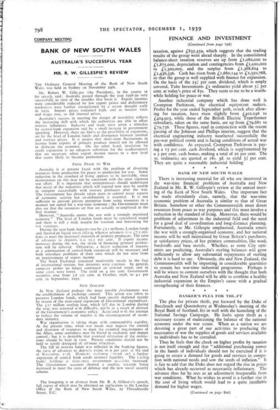NEW ZEALAND
In New Zealand perhaps the most notable development was the establishment of exchange control. This action was taken to preserve London funds, which had been greatly depleted mainly by reason of the over-rapid expansion of Government expenditure. The £17 million sterling loan, which fell due in London during the year, was renewed with difficulty, partly as a result of distrust of the Government's economic policy. Associated w.th the attempt to reduce the volume of imports is the encouragement of secon- dary industry.
War organisation is taking shape with commendab'e rapidity. At the present time, when war needs may require the control and diversion of resources to meet the essential requirements of the Allies, some usefulness may be found in exchange and import control ; but it is desirable that eventual relaxation of the restric- tions should be kept in view. Present conditions should not be held to justify disregard of ultimate objectives.
The fall in oversea funds was reflected in the banking figures, the ratio of advances to deposits rising to 9 per cent, at the end of November, 1938. However. exchange r-Nnirol and a further expansion of central bank credit restored liquidity. The t:a ding banks' holdings of short-term government secreities increased. The Government accounts showed a surplus. taxation being increased to meet the costs of defence and the new social security scheme.
The foregoing is an abstract from Mr. R. A. Gillesp'e's speech, full copies of which may be obtained on application to the London Office of the Bank of New South Wales, 29 Threadneedle Street, E.C.












































 Previous page
Previous page